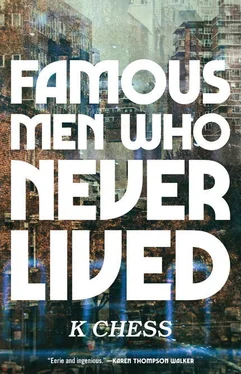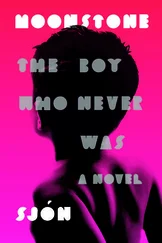Insultingly self-congratulatory, really.
Still, I wish the agent from the power delivery infrastructure company had been as plainspoken, as realistic about my limits. He thought my brain was an ordinator, that I had blueprints stored in my synapses. All I could tell him was my own system. How I’d picked out who would go and who would stay.
“You were fair,” he said. “You made it as fair as you possibly could.”
“You’re just trying to flatter me,” I said.
“You could do good work again. Imagine if power were cheaper, if we could modernize. Wars, Iman, are fought here over oil. Help me stop that. Help me use what you know.”
There’s a lot of tech they don’t have, that the Gate could potentially unlock. I’m surprised I haven’t been asked for more. But I told him nothing.
Because Mornay was right about me. I’d already given all I had.
Hel found Dr. Carlos Oliveira waiting for her in James J. Walker Park in the West Village, deep in conversation with two little girls with hair the same shade of red, both under the age of seven or so, both dressed in immaculate playclothes. A sharp-eyed young woman who must have been their nanny sat on a nearby bench. As Hel approached, the girls dissolved into giggles—the little sister merry and daring, the older one reluctant, half-shy. Oliveira smiled benignly from under the brim of his hat.
Hel knew what they were staring at. Oliveira’s area of study—the spread of disease—was as relevant in this world as in his own, and he’d redemonstrated his brilliance immediately upon his arrival. He’d earned an endowed chair in sociology at the CUNY Graduate Center. His new, rewritten book, a social history of cholera outbreaks in the nineteenth century and the birth of modern epidemiology, had won last year’s Robert K. Merton Award. Now his celebrity spanned two worlds; he had the distinction of being the least-hated UDP there was. Consequently he’d become a generally recognized spokesperson for the whole community. It was crazy that he’d even responded to Hel’s email when she’d written last year to ask for his theories about the workings of the Gate, unbelievable that he’d pursued a friendship with her.
But she doubted the girls recognized Oliveira from his recent New York Times profile. By anyone’s standards, he stuck out of a crowd. As she stepped closer, she saw him open and close his pincers rapidly—first the left set, then the right. Amazed laughter burst from the younger girl while the big sister covered her face, peering at him through the gap in her fingers.
“There are two bones in the forearm,” Oliveira told them. “Radius and ulna. You have them too. Mine were separated by surgeons after I lost my hands. They fixed the muscles so I can use them to pick things up. Like chopsticks.” All the while he was talking he was gesturing with his maimed, modified arms. The children looked on, transfixed. Hel had been given to understand that the procedure existed in this world also, but having been invented by a German, it wasn’t common in the United States, where bilateral hand amputees were much more likely to be fitted with prosthetics.
As she watched, he deftly picked up his high-tech phone from his lap and used one stubby digit to jab the voice-control button. “Call Helen Nash,” he intoned, then said to the girls, “See? Very useful to me.”
“I’m right here,” she said, as her own phone buzzed from her pocket. “Sorry I’m late. These underground trains…”
“Whatever time you choose to arrive is the correct time, my dear,” he told her with characteristically immoderate gallantry. “I must somehow have arrived early.”
The nanny on the bench called to her charges. Hel glanced back at the children with dislike. No one had known exactly how the Gate would function. They’d deemed that only adults could be legally eligible to risk evac. If your name was chosen by the ordinator, you had to say yes or no immediately and then report to the site in Queens—no time for good-byes or drawn-out decisions.
Most parents of small children had said no.
“Let’s walk,” Oliveira said, as he always did. Silently, she handed him the bouquet of red carnations she’d picked up at a corner grocery on the way over, where she’d stopped to buy an energy drink for herself. Oliveira took the flowers. “Feeling wealthy, are you?”
“No.” They meandered down Saint Lukes Place; without discussing it, they turned right onto Bleecker Street toward Father Demo Square. Hel squinted into the bright autumn sunlight at the people around them, slightly scruffier than the West Village denizens of her own time and place. She took a fizzy sip of her Rockstar.
Energy drinks were possibly her favorite thing about this universe, but the store where she’d bought this one displayed a NO ALIENS sign prominently on the register. She’d considered taking her custom elsewhere. Instead, she handed the proprietor exact change for the drink, then swiped the flowers from the stand outside the door without paying. “I just feel like celebrating,” she told Oliveira now. “I’m making progress on a project.”
“What project is this?” Every time they saw each other, the old man asked her about her recertification. The American Board of Medical Specialties had quickly established re-licensing protocols for UDP doctors, just as the American Sociological Association had helped Oliveira transfer his tenure, but she’d never looked into the details of this process—she lived perfectly fine on public assistance. Her focus was elsewhere now. “Ezra Sleight,” she said. “Do you know much about him?”
“Ah. That’s Dr. Bhatnagar’s specialty, correct?”
Vikram, tossing around his damn flashlight like a cowboy. “Used to be.”
“ The Pain Ray ,” Oliveira said, eyes closed. “I read that one when I was a boy. How could anyone forget The Pain Ray ? Yes, I know of Sleight. What about him?”
“His house in Brooklyn. He lived there from ’35 to ’57. After. I’ve found it here. I talked to the man who owns it.”
“But Sleight didn’t live there,” Oliveira said. “He never existed.” They had stopped in front of a green-painted bench. Oliveira handed the carnations back to Hel as, stiff-jointed, he levered himself to a seated position.
Hel sat down next to him. “No. That’s not exactly true. He was born. He lived to age ten. 1909, Carlos. That’s when he died. It’s the oldest change I know about.”
“Everyone says 1910, don’t they.”
“Exactly! But Sleight died in 1909. I’m sure of it. The Brooklyn Daily Eagle has some of its archives online; there was a profile on NorthKing Baking Soda, Ezra Sleight’s father’s company, that mentioned his son’s recent drowning. It didn’t say the date of death—just the year. I need to do more digging, to find the death certificate or something.”
“It could have been a mistake. A typographical error.”
“Yeah, I guess so. But what if it’s not? If it was 1909, that’s months before any of the other recorded divergences. It’s got to mean something!”
Oliveira eased off his glasses. “Are you positing a causal relationship? Do you think Sleight’s death influenced it all somehow? A ten-year-old child, son of a baking soda tycoon? That’s what changed the world?”
“You sound like Vikram with the causal stuff. I’m not an idiot, OK? It doesn’t matter if he’s the cause. Him being first is still significant. There should be a museum. Can you imagine it? Right in that old house. A museum.”
“To Sleight?”
“To the earliest of the deviations anyone’s been able to discover. It wouldn’t just be for him; it would be about all the others. A memorial to everyone else we lost, starting with the first. By the middle of the twentieth century, many of them were never even born, you know.”
Читать дальше












